Unf**king the Climate - Part 1: What's the Problem?
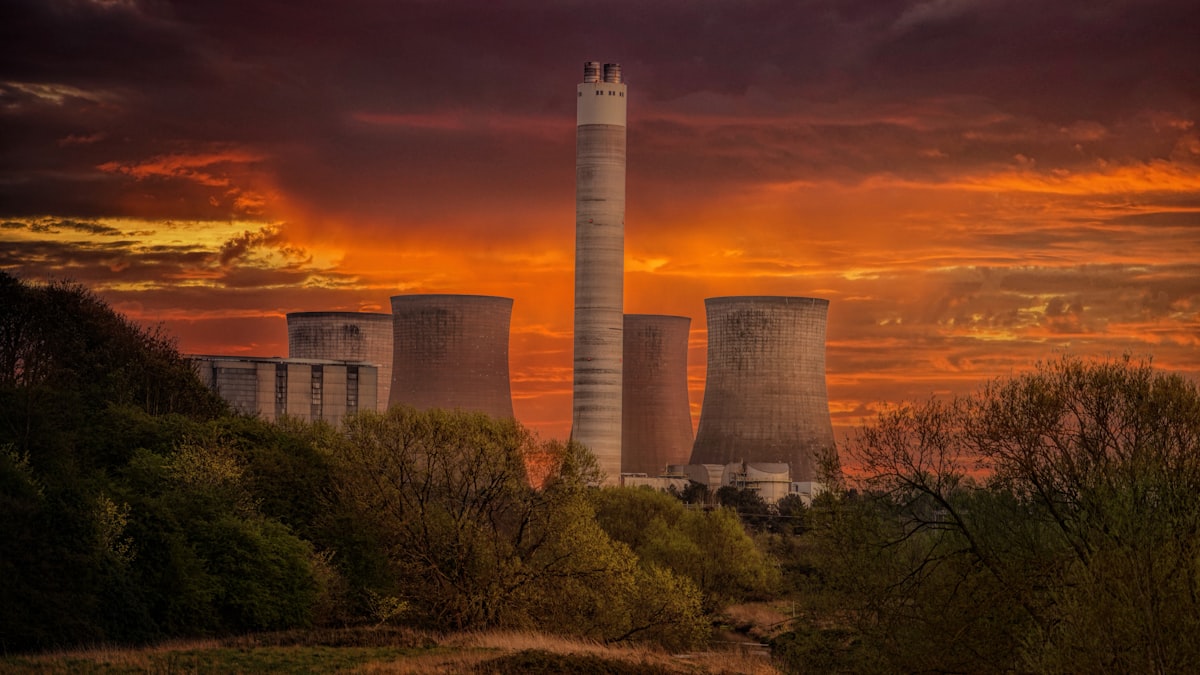
Thank you for joining a growing number of people undertaking a personal mission to help solve the climate crisis. Every year the intensity of the climate crisis is more concerning, and more people want to do even more than ever before, but figuring out where to start, navigating between greenwashing and meaningful action, can be a really tough job for people who don’t have infinite time to research every topic extensively.
Let me break it all down throughout a series, where we're going to start with the basics, and rapidly smash past "change a lightbulb, save the planet" and stop just short of "overthrow capitalism"... although that would be pretty effective if we could figure it out.
The Problem
Carbon Dioxide, Methane, and other “Greenhouse Gases” are naturally occurring, and are important for life on Earth. The Earth generally kept this all in balance for millions of years. Volcanos, herds of buffalo, all being kept in balance with oceans, wetlands, peat bogs, and forests absorbing most of the CO2, and keeping the ecosystems functioning correctly so they're not rotting away and causing methane.
Since the Industrial Revolution (mid 18th Century) we’ve been pumping out dangerous amounts of these gases, whilst cutting down and burning the trees, building cities on the bogs, and draining the wetlands for agriculture. These "carbon sinks" have been shrinking, and the carbon sources have been growing, all at an exponential rate, and this has created an imbalance.
The gases are building up, trapping heat, and making weather patterns for erratic and extreme, destroying habitats, raising the sea level, and making forest fires more frequent and extreme.
The Earth has always heated and cooled through various ice ages and warm periods, but its been ~100,000 years since it was this warm, and we're rapidly heading to temperature ranges last experienced 2-3 million years ago.

So what is being done about it?
In 2015 a bunch of countries got together and decided on the Paris Agreement, “the increase in the global average temperature to well below 2°C above pre-industrial levels” and pursue efforts “to limit the temperature increase to 1.5°C above pre-industrial levels.”
World governments made a lot of empty promises, and carbon emissions contonued to rise from 2015. Everyone got their hopes up about COP26 in 2021, another meeting where a bunch of countries all agreed they'd definitely try to keep global warming to 1.5°C by 2050, despite already being at 1.2°C.
Unsurprisingly global carbon emissions are still rising in 2023, and 1.5°C is looking increasingly impossible to obtain. Thankfully since COP26 it seems like 4.5°C and above can be ruled out, but 3°C is still completely possible...
Current policies presently in place around the world are projected to result in about 2.7°C[1] warming above pre-industrial levels. NDCs alone[2] will limit warming to 2.4°C. When binding long-term or net-zero targets are included warming would be limited to about 2.0°C[3] above pre-industrial levels.
– Climate Action Tracker, Temperatures
Climate Action Tracker help us visualise where we're at and where we could be heading by 2100.

Clearly the world is not on track, and drastic change is needed to get us there. You'd have to assume some countries are doing well though, and showing the way?
Nope. Climate Action Tracker monitors the policies and actions of countries, and gives them a status based on their progress towards meeting their commitments to the Paris Agreement. Any country on the map below that's highlighted green is doing just fine, keeping us on track for a 1.5ºC world (so long as the other countries also catch up).

Briefly for one glorious moment Morocco and The Gambia were on track for their part of a 1.5ºC world, but since then they've dropped off into Almost Suffient (yellow). How is your country doing? If you're orange, that's Insufficient. Red? Very Insufficient. Grey? Critically Insufficient!
Most major developed countries - the ones with the money to easily be able do something meaningful about the problem - are rated between “Insufficient” and “Critically Insufficient” because they are not doing their part. What exactually constitutes "their part" is often confused with "which countries are emitting the most each year", which always puts China, United States and India at the top of the charts.
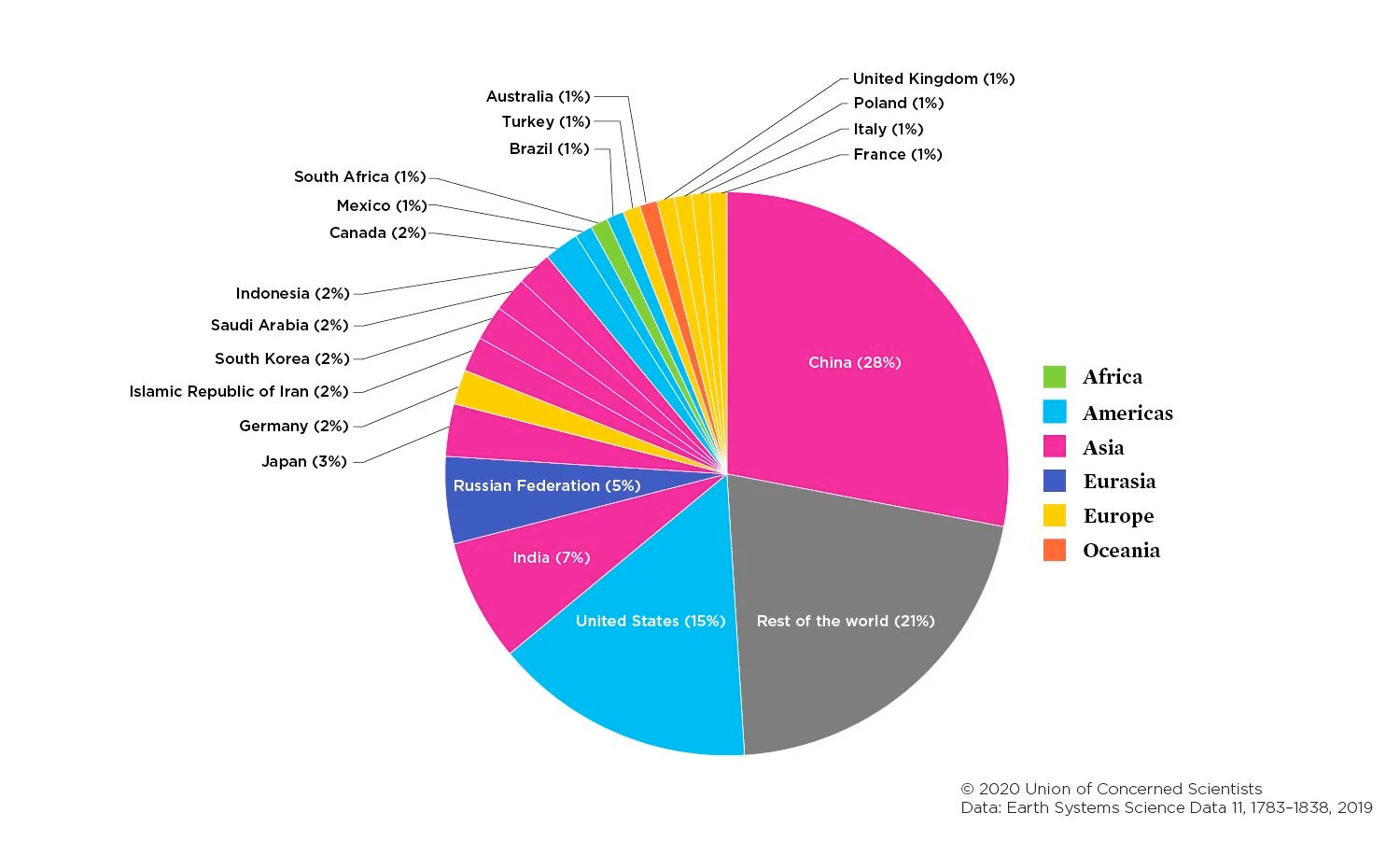
This makes some people think “Well I’m not in China or the States, my country is only doing 1% of the damage so… why should we bother doing anything, they should fix it!” Frustratingly this arugment is often made by people in countries like the U.K., who think their 1% is so small they're "basically net-zero", whilst China is the only country that needs to fix all this mess. Not a straw man.
I've heard literally exactly that argument made countless times, and here Nigel "sad face drawn on a scrambled egg" Farage deployed that nonsense against the consistently amazing Paul Powlesland in this interview, whilst arguing about when, where, how, and if, climate activists should ever protest.
'As a man of law, you think this behaviour is acceptable?!'
— GB News (@GBNEWS) April 18, 2023
'Do I think minor disruption to a sporting event is bad? I don't think it is.'@Nigel_Farage clashes with Barrister Paul Powlesland over Just Stop Oil protesters planning further protests in London. pic.twitter.com/JDiAupCDaM
One of many reasons China has such a high carbon footprint is that many countries shrank their carbon footprint by outsourcing all the manufacturing to China, then ignore the emissions involved with shipping those produced goods to their country. China was also being used as the world’s recycling center for decades, ignoring all the shipping involved with sending the worlds rubbish to their shores. This argument also ignores the fact that China has a population of 1.4 billion people, substantially more than most countries.
Perhaps grouping emissions purely by arbitrary lines on the map is not helpful. Let's take a look at dividing those emissions by their population, to see how that effects countries carbon emissions per capita (per person).

The picture changes here quite a bit, putting USA and Canada up there because people love driving around in pickup trucks and flying everyewhere. They've reduced a little bit over the last few years, some of which was the "COVID dip" where people were moving around less and energy demand patterns changed enough a few coal plants were able to get shut down, but they're still massively more wasteful than other countries' populations.
I think this highlights that it's not just "<insert country>" that is creating "the problem", it's wastefulness and inefficiency.
Talking about specific countries gets all wrapped up in nationalism and racism, often with people getting worried about "Too many people" in countries in Africa and Aisa, ignoring the population growth in their mainly white countries... Let's ignore the racial rats nest that is blaming other countries, and see who is mainly causing the problem.
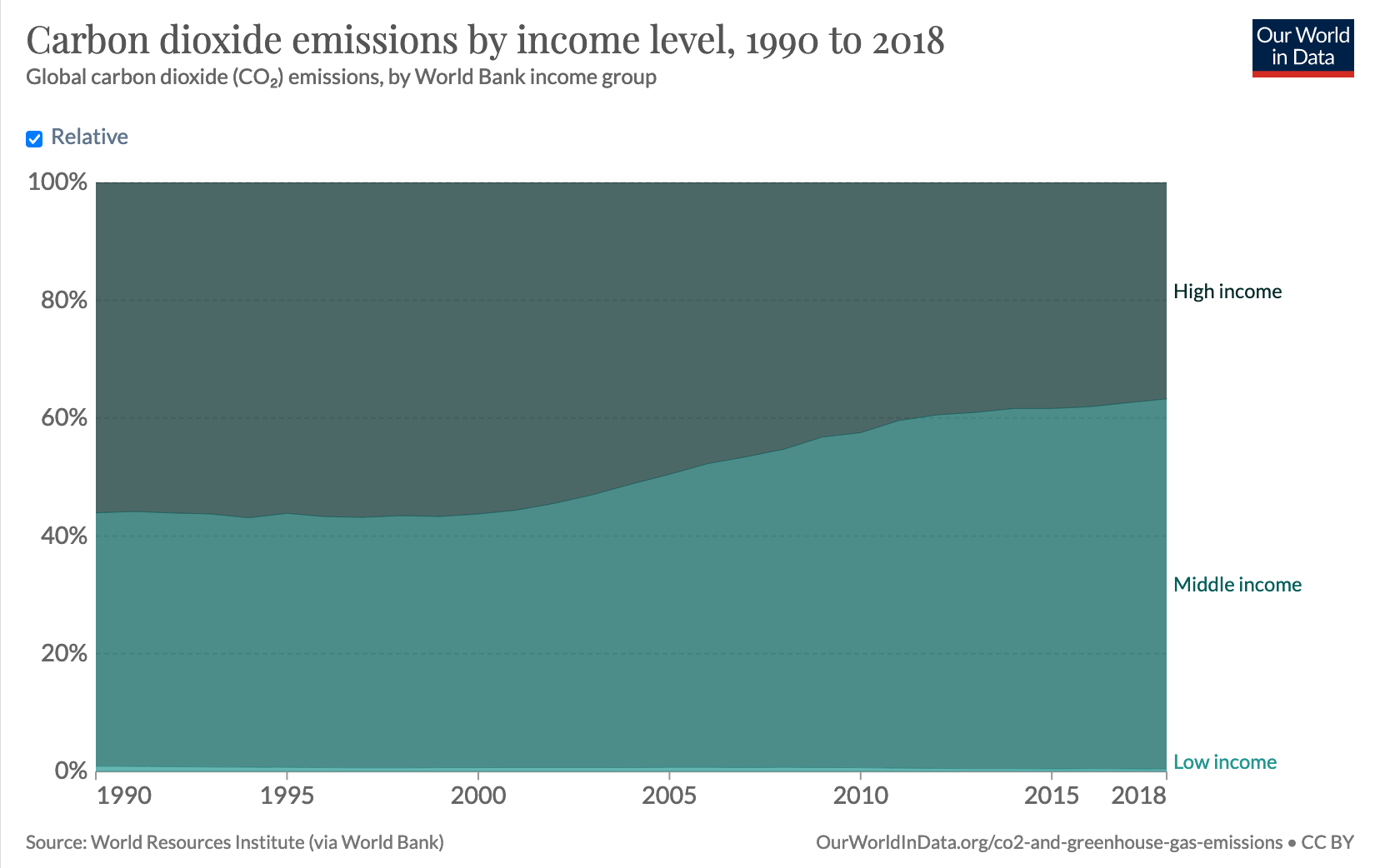
Anyone surprised the answer is "Rich People"?
It's not just the mega rich flying their private jets to their yachts so they can dodge taxes or whatever. It's people with a bigger than average house which requires more heating. A swimming pool, which also requires heating. Driving an SUV which weights 2.5 tonnes to drive to work because they don't want to take the bus, as that's "for poor people".
The climate crisis is predominently class warfare.
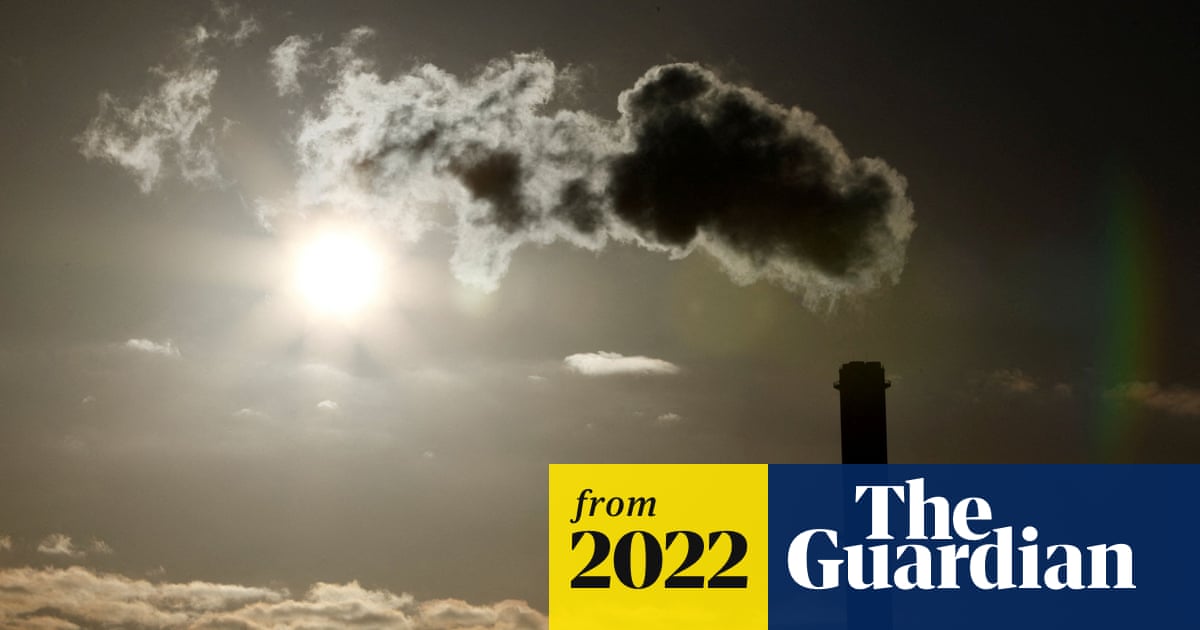
In an ideal world we'd have government making decisions that constrain the ridiculousness of the top 1%, taxing a fair share out of billionares so that low income households can get subsidized solar panels, heat pumps, free bus passes, and cheap electric bikes. This would be part of the bigger picture known as Climate Justice, and it is the best type of redistribution of wealth. One that goes from the top to the bottom, without waiting for a "trickle down" that never comes, and it just so happens to help fight the climate crisis in the process.
People often say that "all this green crap" would be expensive, or ruin quality of life, but climate justice policies fund themselves whilst making your life better. Taxing private jets into oblivion, and setting up frequent-flier levies to get a fair share out of people jetting off to a second home in the south of France whilst not penalising people taking one cheeky holiday or visiting family, etc.
All of this not knocks a huge amount of emissions off from the people disroportionately high footprints, and provide more investments for public transportation and other green infrastructure. More importantly it reduces the burden on low income families (usually people of color), who will have reduced healthcare costs caused by easily avoidable but fatal air pollution, as low income families, especially black and brown communities, are usually the ones shoved underneath the airport or next to the highway.
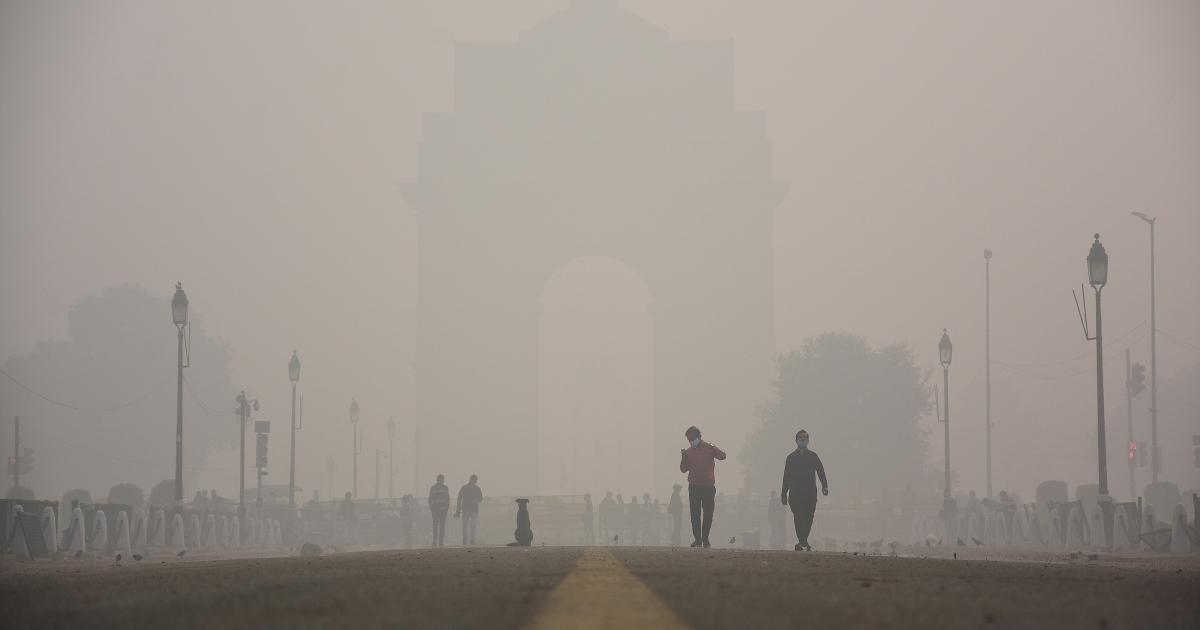
Once again the "lets blame people in some other country" thing is just racism, being pushed by those at the top to keep you looking at people with less than you, causing less harm than you, so you don't direct your anger at those who deserve it: the rich lying bastards hoarding all the money and resources for their own jollies.
Historical Emissions
We can split this chart another way, which is looking at all the emissions
The U.K. might have done a good job at turning off coal plants lately, but that only puts our current annual emissions down. There is still a lot of work to be done to make up for those historical emissions, which were part of how the country accrued its massive wealth. It seems obviously fair that we use some of those ill gotten gains of our colonial past to help developing countries skip fossil fuel reliance and jump straight to renewables.
This is known as the "Fair Share", and is part of the rating a country will receive from Climate Action Tracker. Guess what? The U.K. is not doing its fair share at all.

Of course Westminster has absolutely loads of money to subsidize building solar panels in Morocco, but only because we'll be sending all that generated electricity back to Blightey via undersea cables...
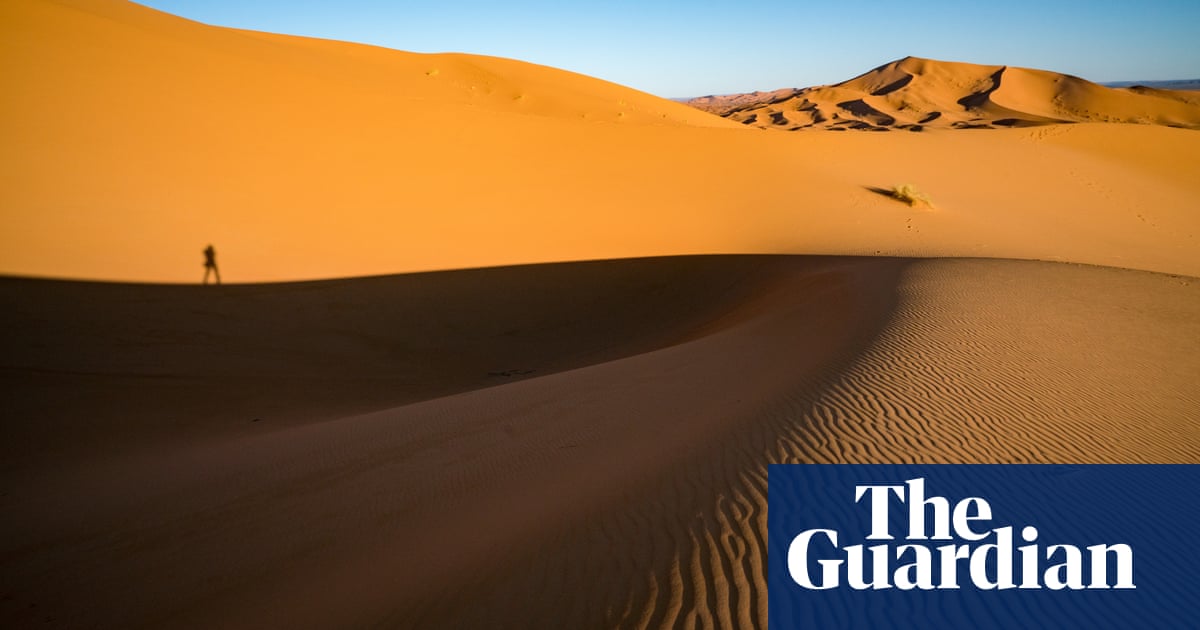
So, we have world leaders doing very little, blaming each other for not doing enough, changing the chart they're interested in to suit their needs in the moment. Of course they're scared to do the big work to change things because they've spent decades telling everyone its too expensive, so now citizens all over are demanding more delays because it couldn't possibly be affordable, even though the entire energy transition would more money than it cost in very little time, with the side bonus of reducing how many people die of air pollution, and how many species go extinct.
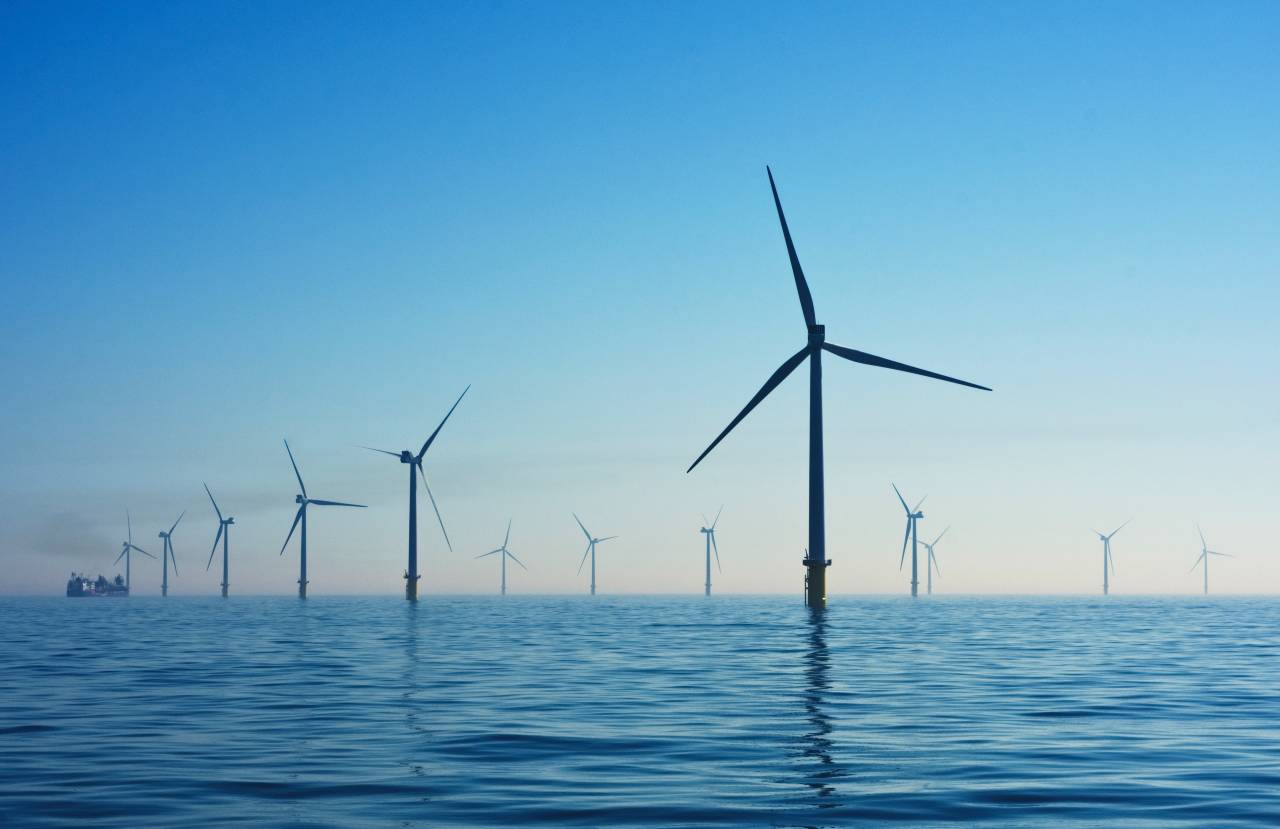
The summary here is that everyone in the countries that aren't doing enough needs to do more, and that's all the countries, so... we all need to do more.
What can we do?
The most important possible thing is to get politicians elected who respect science.
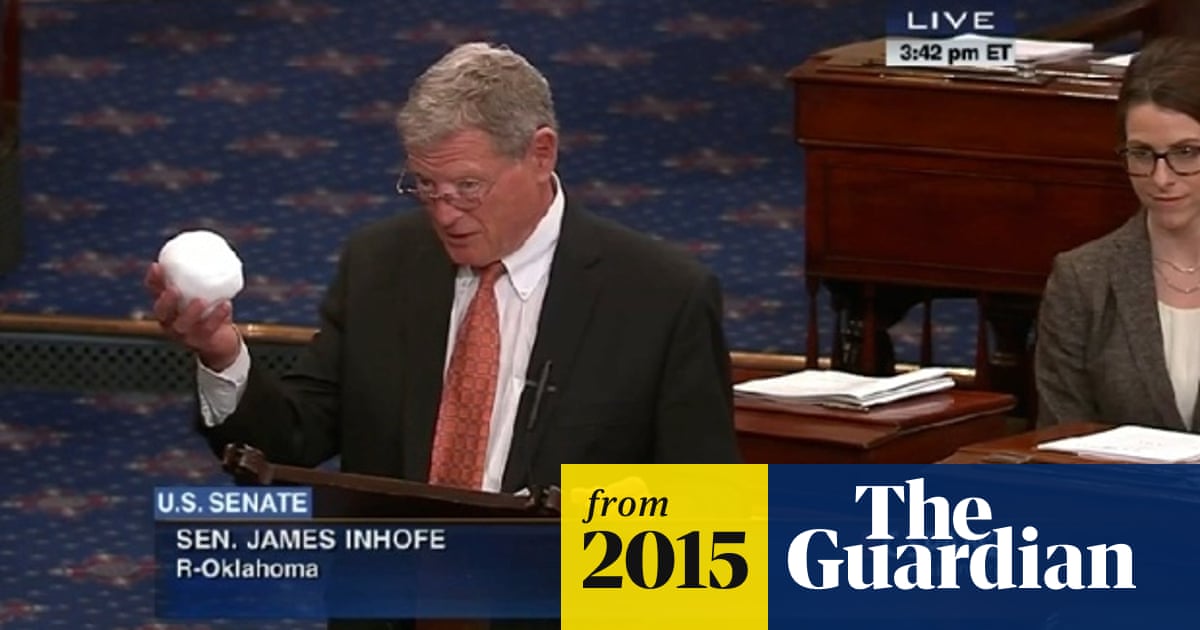
We’ve all seen the awful effects of governments and leaders ignoring science and mishandling the COVID-19 pandemic, and those same leaders generally treat the climate crisis in the same way.
Replacing those leaders is going to be hard, there’s a lot of corruption around the world, and voter suppression is on the rise. That said, my home city of Bristol has managed to elect a Green Party majority, so it's worth paying attention to local elections and not just the general elections.
Helping keep elections fair can be a physical job too, by vollunteering at polling stations, driving people to the nearest voting booth, helping people register by mail, and doing anything you can to get the current “business as usual” leaders out of office, because we don’t have any time to waste.
There are so many policies which could be improving our quality of life, and hitting targets, if only we made it clear that politicians can and must act more aggressively in their climate targets.
- More low-emission zones in cities
- More bicycle infrastructure everywhere
- "Cash for Clunkers" programs
- More bus gates and traffic filters in congested cities so electric buses can replace personal cars
- Building more high-speed rail to compete with flights
- Outright banning flights served by "close enough" speed trains
- Banning greenfield development when brownfield sites are available
- Subsidizing heat pumps
- Implementing district heating to reuse waste heat from industry, power, etc.
- Biodigesters turning sewage into electricity and heat
- Infiinitely more smart decisions that pay for themselves multiple times over through reduced public health costs alone.
Until we get the chance to elect people who aren't somewhere on a scale between "useless" and "actively working to hasten the appocolypse", we do have other choices available that can help reduce emissions.
The Dreaded "Personal Carbon Footprint"
We have control over our personal actions: what we buy, how we travel, where we live, which businesses we support, and which businesses we punish. This all impacts the CO2 emissions “per capita”, also known as a “personal carbon footprint”.
The concept of a personal carbon footprint has a checkered history. It was coined by British Petroleum and pushed by Big Oil (a.k.a. The Bastards) as a way to assign the blame for fossil fuel based carbon permissions on individuals instead of taking any of the blame for funding misinformation, and generally lying about the damaging effects for 40-50 years.
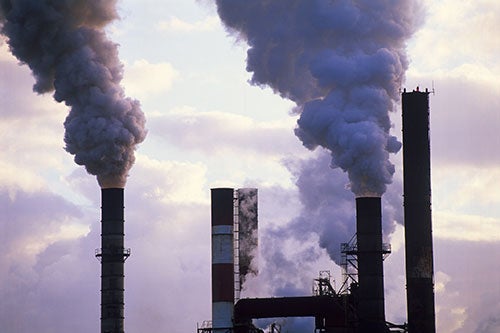
Their whole position was that its not their fault, they're just supplying what we want to buy, and we're greedy little buggers, so its our fault. Of course if they're lyiung about it to the public and leadership and bribing policy makers then of course bad decisions have been made. They are responsbile for the situation we are in, and more fossil fuel CEOs need to be in jail.
I am not here to push their propaganda. Individuals are not “at fault”, or inherently bad for living more polluting lifestyles, but once we’ve been armed with the right information we can and should make decisions to limit how much pollution we are directly, and indirectly responsible for, and a great way to take control over this is voting with your wallet. Boycott "The Bastards" the best you can, weaponising their delay tactic against them.
Whilst the government will always be inherently able to make bigger decisions around limiting methane flaring, protecting marine ecosystems, etc., we aren't completely irrelevant to the climate crisis.
Our own actions, and the actions of those around us, in our families, in our friendship groups, and in our communities, all build up into collective action. At scale collective action can be powerful, signalling to businesses what you will and will not tollerate will eventually tug on their purse strings enough they'll respond. First they'll do the half-assed thing, then eventually doing the right thing when they're caught out enough times. It will also inform councillors what they need to be paying attention to, occasionally letting better policies be made without needing to oust them.
"Green Capitalism"
When companies are doing something damaging, like Tescos buying cattle feed from companies associated with deforestation in the Amazon Rainforest, you boycott them.
When banks and insurance companies support coal mines or power plants, you boycott them.
If an energy company attempts to drill in the Arctic Circle, you switch to an alternative.
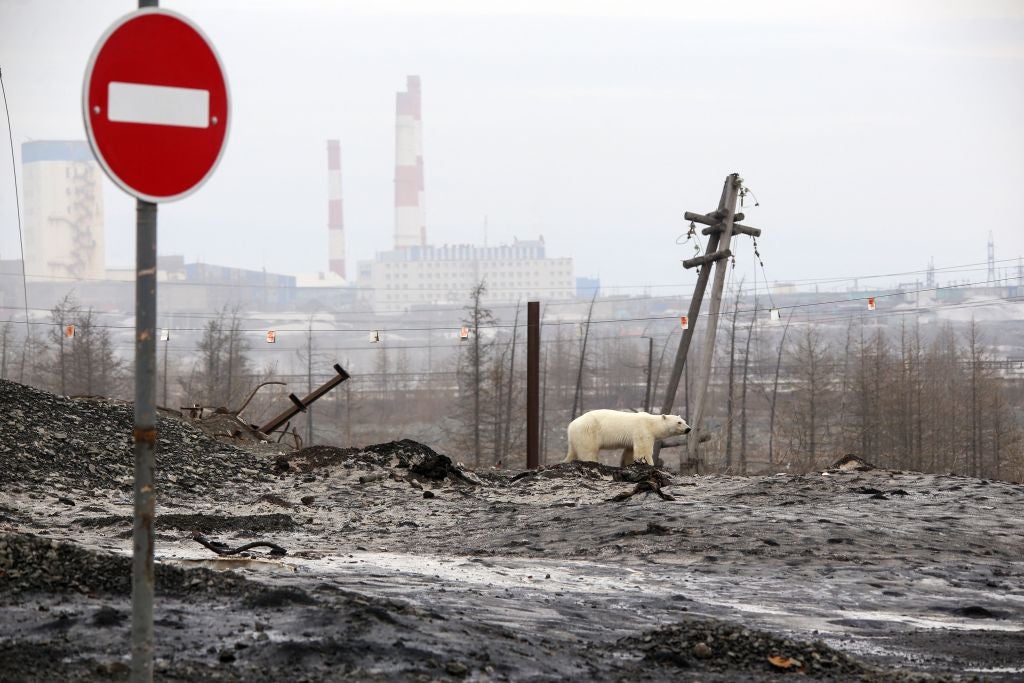
When a company like Beyond Meat comes up with excellent meat alternatives, you buy them even if they cost a little bit more money, so that they can succeed and eventually get cheap enough for everyone else to enjoy at their nearest KFC.
Millennial consumers have increasingly become more interested in knowing where their food comes from, how it was grown and whether it was produced in a sustainable and ethical way. That’s forcing some of the world’s largest food companies and agricultural commodity traders to be more transparent about their supply chains. And for that, they are turning to technology.
– Yahoo Finance, https://finance.yahoo.com/news/starbucks-clients-now-trace-coffee-135240526.html
So long as we are stuck with capitalism, we can work within it, to make it clear that doing the wrong thing is going to be more expensive than doing the right thing. The boards and shareholders aren't necessarily suddenly going green, but they are more worried that they'll have "stranded investments" if they pick the wrong horse, and that wasn't a conversation until activists starting forcing them to take notice.
Many say that green capitalism cannot save the planet, and that's a pretty fair comment. Consumers have been buying Rainforest Alliance Coffee and Fair Trade for decades, but it's not making the difference. I don't think this alone can solve the whole problem, because we need to be buying less stuff not just slightly better stuff. Capitalism also rewards greenwashing, and greenwashing is incredibly hard to spot, but resources like Ethical Consumer can guide you to make better decisions and help work out who needs boycotting next. There's something to be said for steering the ship that we're on, instead of simply wishing for a better ship.
Politicians, businesses, individuals, charities, farmers, scientists, economists, everyone, are all part of this system, and we can all do our bit. Those in the middle income bracket might be tossing up between solar panels or a fancy foreign holiday next year, complaining they cannot afford both. The solar panels will pay themselves back, especially as the energy prices spike around all over the place, and skipping the holiday is a great way to keep emissions down in this critical time anyway. Make the right choice with your money.
People with lower income often feel left out of the climate action discourse because they already can't afford a fancy holiday or solar panels. They don't even own their roof! That isn't needed as you already aren't causing the problem, and your middle/high income landlord should be setting that up for you. That said, seeing as low income housholds are more likely to be negatively effected by the worst effects of pollution and the climate crisis, then you're probably not wanting to just sit the fight out. You don't need to be worrying about buying a Tesla to save the planet, let's focus on campaigning, fighting for climate justice, and choosing which companies we want to avoid giving our hard earned money to.
Volunteering
There are so many amazing things you can get involved with doing as a volunteer.
My charity Protect Earth runs volunteer days throughout the year, planting 30-40,000 trees each winter, restoring ancient woodlands, cutting down invasive species that knacker the biodiversity and carbon sequestration potential, and much of the work is done by amazing volunteers who want to be out there doing something in their community to help.
The volunteers at these events represent a crossection of society. Not just "tree huggers" and "hippies", but regular people who are very concerned about the climate crises and didn't know what else to do. These people often become friends, and this has helped me not feel like I am screaming into a void.
Some of the volunteers I've met now work for the charity. Some grab drinks and we hatch plans together. Some stay on each others sofa or give each other lifts so we can get to more events. Some started other charities and organizations and we promote each others work. Networking is the compounding benefit of volunteering, and when you find your people it can make the wscale of the challenge less daunting.
Find a local environmental charity that does something you believe in, and see how you can help them scale infinitely, because even if its just sending emails or baking cakes to raise money, those charities desperately need help with something and you could help them grow their impact.
Beyond Carbon Emissions
There are several other conflicting crises that which provide negative feedback loops, beyond simply carbon dioxide and the other greenhouse gases.
We also need to fight plastic pollution, because microplastics are now showing up in the rain in Antarctica, and in the placenta, affecting unborn children.
Then there's the biodiversity crisis, which is the loss of habitats, species, and entire ecosystems. Losing ecosystems to housing, road building, deforestation, extreme weather, or generally degrading due to the changing average temperatures, all emit more greenhouse gases.
We'll talk more about fighting the plastic and biodiversity crises as we go, because its impossible to seperate them from the greater climate crisis, even if they are technical distinct issues.
Thanks for reading this, I know it's a long one, but setting the ground work for how we're going to fight the biggest threat humanity has ever faced wasn't going to be a short one.
Please support my work by subscribing! I'll be writing more about climate solutions, holding politicians to account, and living fossil-fuel free in an electric van, which is soon going to run off of invasive trees... The first 100 paid subscribers get a bushcraft surprise, probably a whittled spoon or a penny can stove. 🙌





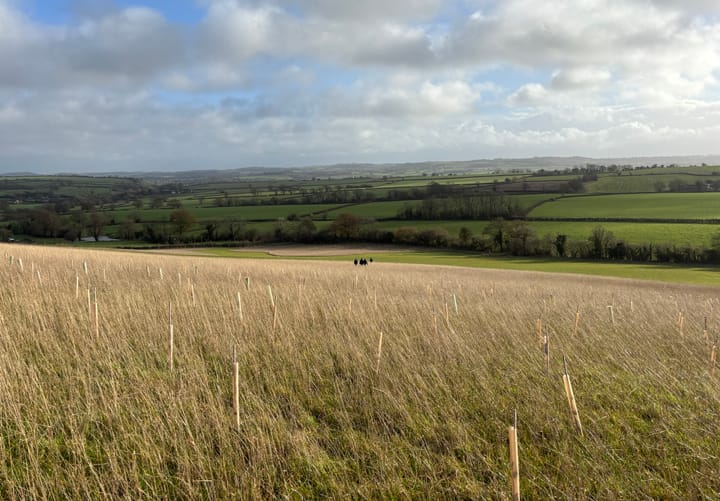
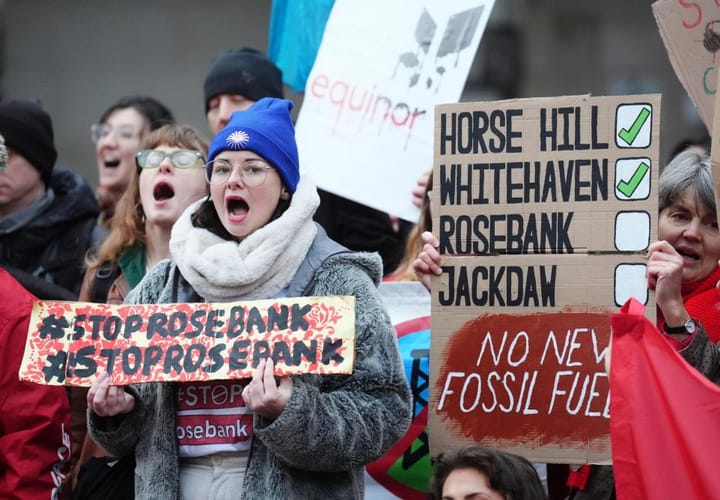
Comments ()